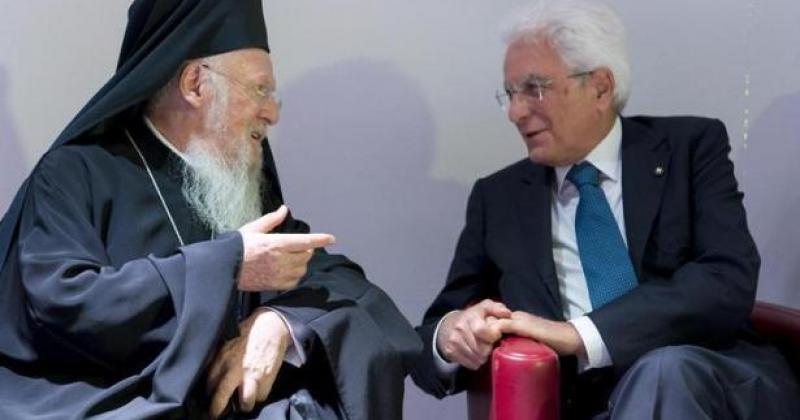Ecumenical Patriarch of Constantinople of the Eastern Orthodox Church Bartholomew I was among the protagonists of the second day of meetings in Assisi. The Orthodox leader once again stressed his commitment to peace and expressed an ecclesial vision similar to Francis’. Meanwhile, Kasper said “Christian unity is a sign of the times against conflict”. Rabbi Rosen added: The fact that such a negative relationship as that between Jews and Christians has been radically transformed, shows that anything is possible”. On Tuesday, the Pope is to lunch with 25 refugees in the dining hall of the sacred convent in Assisi
“A bishop can only be an inspirational leader insofar as he is –above all else - a real servant; whether he can be a merciful father of the Church depends on the extent to which he is truly a faithful son of God, without pretending or pursuing authority and power. In fact, regardless of our position, we are all called first and foremost to be children of God and not people’s masters”. These words were pronounced by the Orthodox Patriarch of Constantinople, Bartholomew I, in a speech he gave at Assisi during a ceremony in his honour. His words once again bring him closer to Pope Francis’ magisterium. The inter-religious meeting organised by the Community of Sant’Egidio and the Franciscans in the Umbrian city of Assisi, is in progress. The theme of this year’s meeting is “Thirst for Peace: Religions and Cultures in Dialogue” and marks the 30th anniversary of the first inter-religious event of its kind, attended by John Paul II.
Among the protagonists of this second day of meetings, was Patriarch Bartholomew, who received a degree honoris causa in international relations from the University for Foreigners of Perugia. Then, in the afternoon, an important inter-religious meeting in his honour was held in Assisi. One of the things the Orthodox leader said at the university in Perugia during the morning even he attended was that: “cultures and religions have already met before to carve out paths of peace but this process absolutely must continue in order to prevent intolerance and religious fanaticism from emerging, to preserve the value of each culture so that it is not sacrificed at the altar of globalization or of a culture that dominates over others.”
The day in honour of Bartholomew in Assisi saw the participation of Cardinal Walter Kasper, Rabbi David Rosen, the Anglical primate Justin Welby, who moderated the event and Andrea Riccardi. Bartholomew was not expected to be there initially but he attended in the end. “Like you, we believe,” said Cardinal Kasper, “that unity (between Christians, Ed.) is a command from the Lord and a response to the signs of the times in a world that is increasingly united but at the same time profoundly divided and wrought with conflict. This unity is not about absorbing, watering down or standardising, rather it is the unity that comes from reconciled diversity, which Pope Francis talked about during his visit to the Fanar.”
One of the many interesting speeches was that delivered by Rabbi David Rosen who is on the Jewish-Christian dialogue panel. Rosen recalled the great progress made in the last 30 years and the turning point marked by the Second Vatican Council and the “Nostra Aetate”: “if a relationship that was as fossilised, poisoned and negative as the one between Christians and Jews was able to undergo a radical transformation, then anything really is possible, we can transform the world into what our religions teach us it should be.” The turning point that came with the Council was also underlined by German bishop Heinrich Mussinghoff, who said: “thanks to the Second Vatican Council, the so-called perfidis Iudeis became our elder brothers an sisters.”
One of the most important meetings scheduled to take place on the final day, in addition to the official events, is the lunch the Pope is to share along with 25 refugees in the great dining hall of the sacred convent. The group of refugees is made up of Christian and Coptic Catholics and Muslims. There will also be a six-year-old girl among them, called Maria, who arrived from Syria with her parents four months ago. The refugees come from Syria, Pakistan, Afghanistan, Eritrea, Mali and Nigeria. Ten of them are being hosted by CARA Castel Nuovo, the local hosting centre for asylum seekers, five other by Caritas Assisi, while another ten came to Italy with the Pope, on his way back from Lesbos, thanks to the humanitarian corridors arranged by the Community of Sant’Egidio and the federation of Evangelical Churches in Italy. They will be lunching with the Pope, the Ecumenical Patriarch Bartholomew, the Syro-Orthodox Patriarch Efrem and the Polish philosopher and sociologist Zygmunt Bauman.
